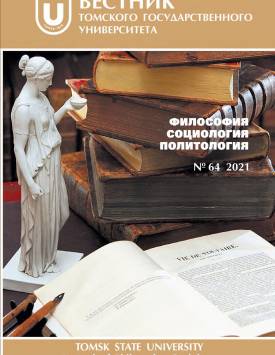Dispute on the Agenda
In the article, we characterize the dispute on the agenda as a type of non-thematic communication, show its specifics, analyze its relationship with the thematic dispute. We also describe the ways of assessing the results of the dispute on the agenda, to present the positions of agents in relation to their strategies and risks. These questions are illustrated by the analysis of dispute on the Internet. We made the following conclusions. Agenda disputes, or non-thematic disputes, are ubiquitous in communication. They are more about a conflict of interest than a divergence of opinion. Such disputes carry risks for the status of the participants, since, unlike in thematic disputes, the resolution of the dispute on the agenda determines who and according to what rules will dispute about the subject. This, firstly, outlines the range of options for its solution; secondly, this often predetermines them; and, thirdly, due to the adoption by the parties of the rules, this reduces the social distance between them, discursively equalizes their rights. The integral assessment of the agenda dispute arises as a combination of assessments on four scales reflecting four aspects of the dispute: epistemic, actional, interactional, and public. The main role here is played by the aspects of interaction and publicity. This circumstance is associated both with the historically established forms of public deliberation and with the communicative methods of unelected representatives and actionists, who achieve the most significant results in disputes on the agenda, namely, the recognition of their political subjectivity. There are logical-pragmatic relations between the dispute on the agenda and the related thematic dispute, on the basis of which it is possible to ascribe the positions of the agents in the dispute on the agenda that reflect their attitude to resolving the dispute, their strategies of behavior and risks. Eight such positions were identified, which made it possible, in particular, to clarify the essence of actionism as an attack on the indifferent position of the counterparty, to identify the properties of an agent for whom, on the contrary, no communication is acceptable, to describe the features of various forms of promoting and blocking topics and arguments in non-thematic and thematic disputes. An analysis of examples showed that reaching a non-thematic level is a frequent and productive maneuver in a dispute that undermines interaction, and blocking it, regardless of the course of a thematic dispute, brings the agent success, primarily in the aspect of publicity.
Keywords
dispute, discussions, agenda, agent’s positionAuthors
| Name | Organization | |
| Elagin Gleb B. | Saint Petersburg State University | elagingleb@gmail.com |
| Mikirtumov Ivan B. | Saint Petersburg State University | imikirtumov@gmail.com |
References

Dispute on the Agenda | Tomsk State University Journal of Philosophy, Sociology and Political Science. 2021. № 64. DOI: 10.17223/1998863X/64/1
